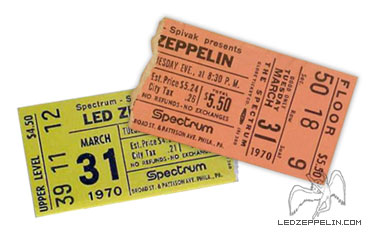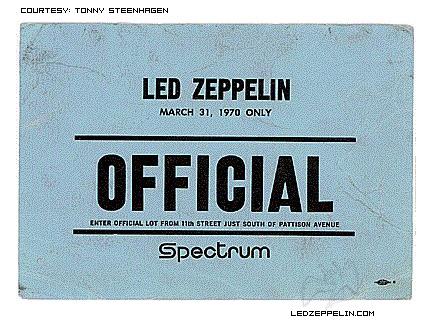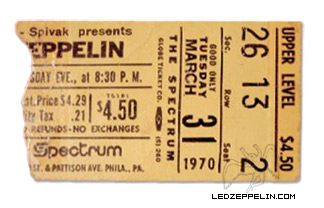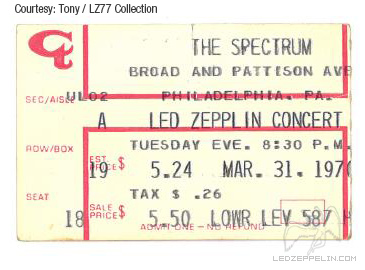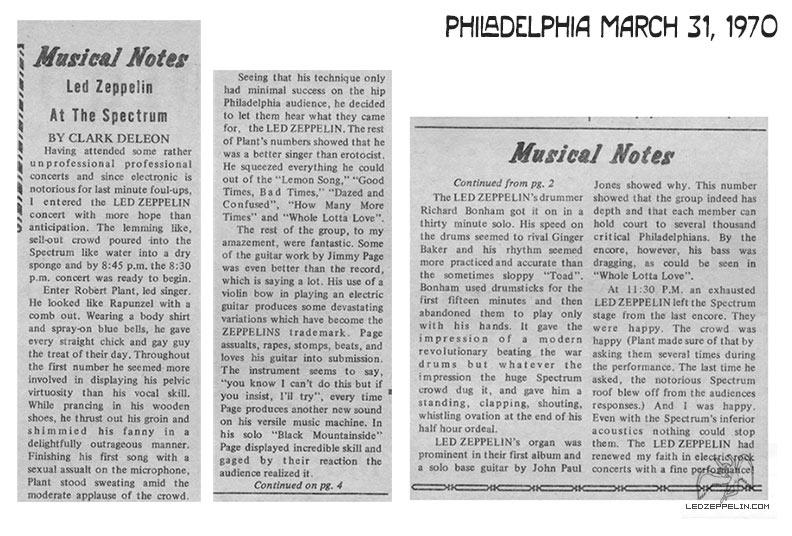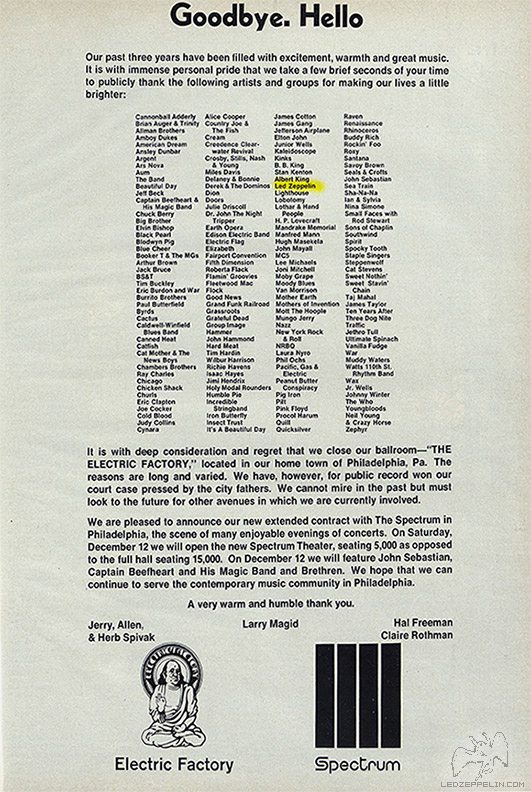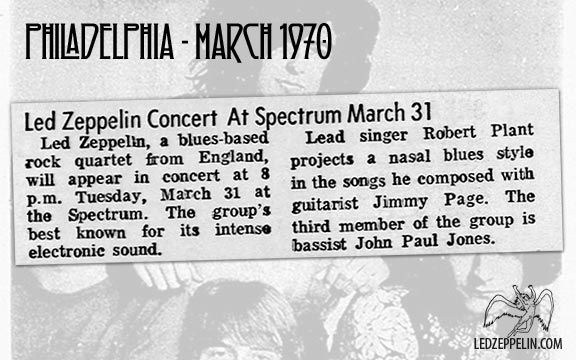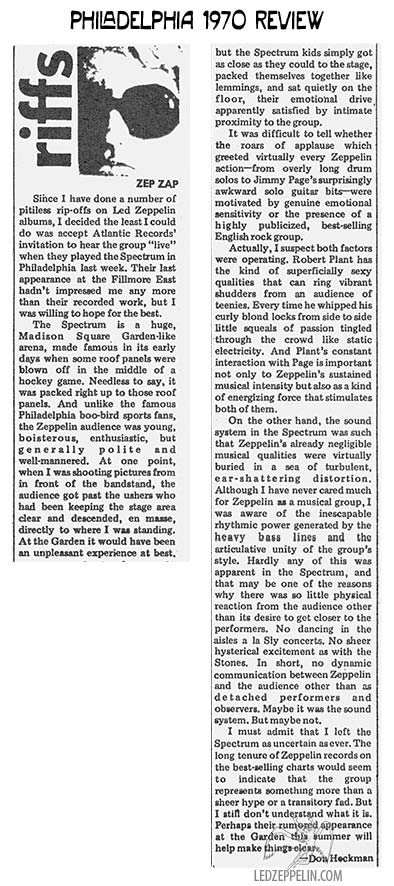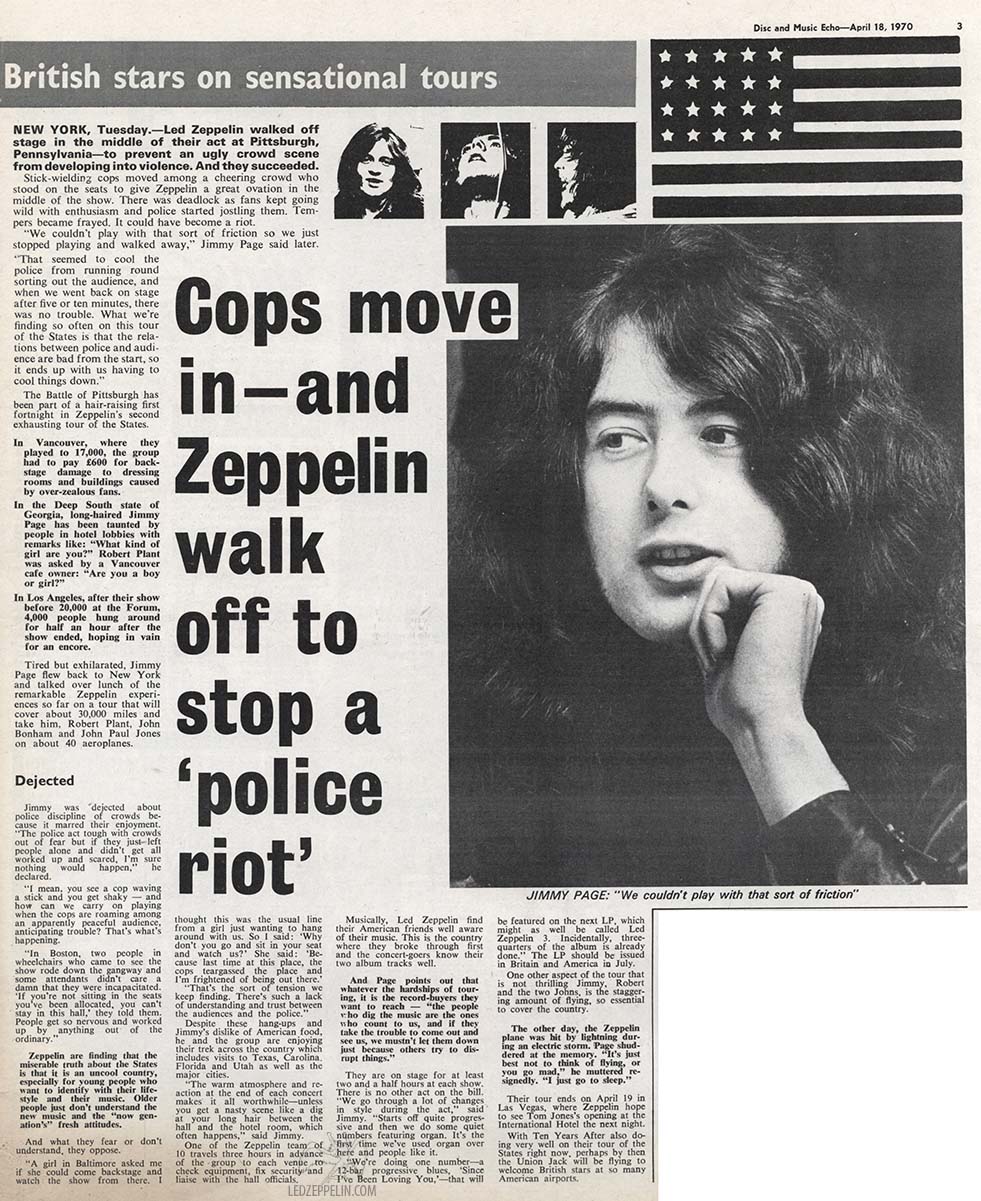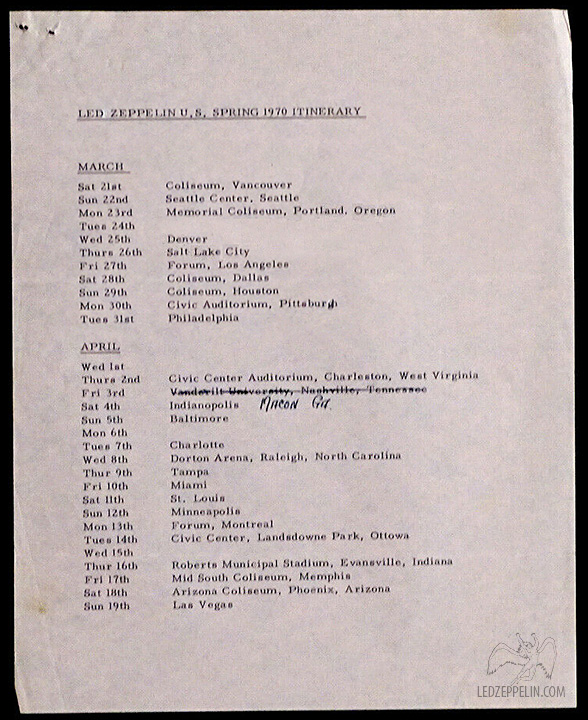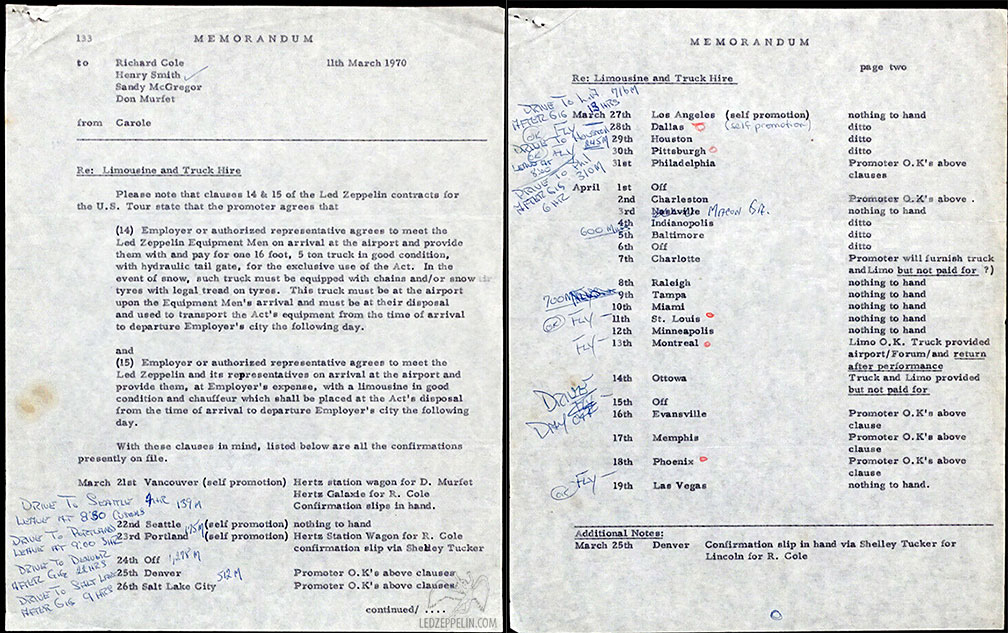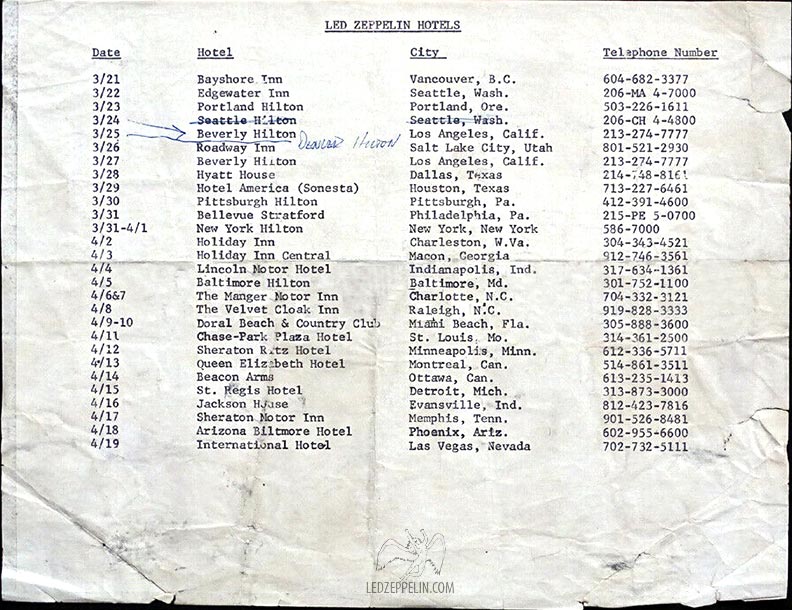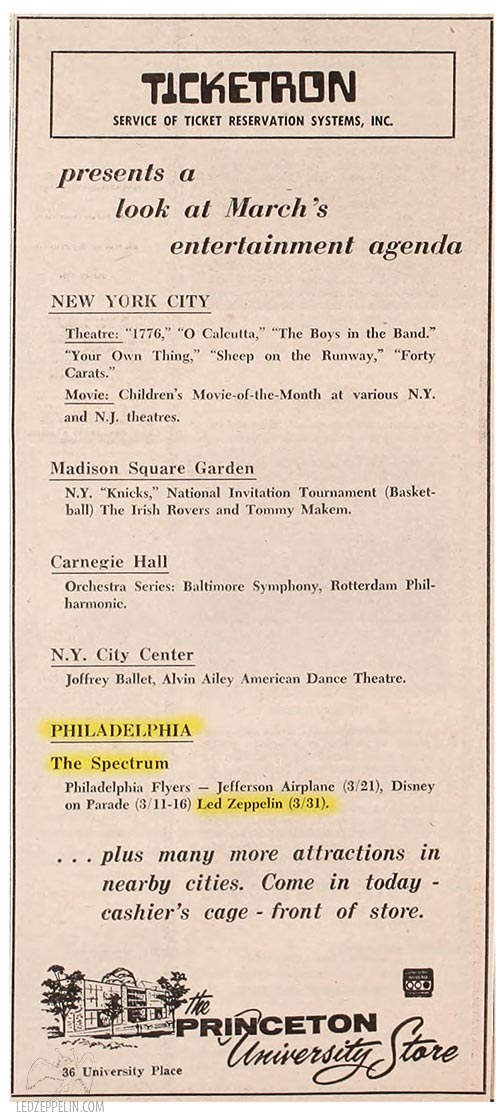Includes: We're Gonna Groove, Dazed and Confused, Heartbreaker, Bring It On Home, White Summer / Black Mountain Side, Since I've Been Loving You, Organ solo / Thank You, What Is and What Should Never Be, Moby Dick, How Many More Times (medley incl. Long Distance Call, Boom, Boom, Boom, Tobacco Road,Lemon Song), Whole Lotta Love, C'mon Everybody, Something Else.
Press Review: Taking the Mask From Zeppelin
For 15,800 cosmics who bought out the Spectrum last night to partake in the 150-minute, straight-run Led Zeppelin concert, it was all top-shelf – pure and uncut.
Without second-raters cluttering the bill, there was the rare opportunity at a rock concert for both performers and audience to expand with each other. Both groups enjoyed the opportunity to “really get into things”.
Last night was considerably different from Zeppelin’s last appearance here at the Summer Rock Festival. Then they dew a poor third billing. Never again though. Since that time, the white, blues-based English quartet has increased its stature substantially on both popularity and money maker charts.
They rode high on charts with their first album during the later part of last year and are still perched in lofty spots with their second offering: Led Zeppelin II.
Last night’s concert was like most others for the Zeppelin during the group’s current 25-city, four week cross country tour. Big, big crowds and even bigger money. If you’re a producer and you want the Zeppelin for a two and a half hour concert, then you’ve got to pay. Each concert on the tour carries a hefty $25,000 minimum, with some fetching the group in excess of $1 million.
What makes Zeppelin a top-seller is probably impossible to answer. For this writer, the intrigue has always been their wide ranging and unpredictable balance of interests and technical expertise.
Unfortunately, much of what I find appealing is now masked behind the volume of high-voltage electrical wizardry. And last night’s performance spotlighted the mask.
In numbers where each of the foursome is given long, free-running solos, their expertise and unpredictable balance of musical instruments is exposed. John Bonham, the group’s 21-year-old percussionist gave an astounding 25 minute demonstration which brought the audience to its feet. And John Paul Jones, who alternates between bass and organ, added significantly with his melodic organ arrangements.
Then there’s lead guitarist Jimmy Page. Once a member of the famed Yardbirds, Page has the talent and technical ability to be as fine as Eric Clapton, but too frequently his imagination is muted by heavy-handed volume. In his solo number “White Summer”, his combinations of progressive rock country and even some Spanish elements exposed the fine guitarist.
The Zeppelin’s lead vocalist is Bobby Plant, an assertive, ego-type performer who has transformed a basic black blues sound into a plastic commercial seller. He’s a Conrad Birdie of the 70s. He slithers and gyrates across the stage, heading long, blond tresses from side to side. Howls and blouses from young lovelies in the audience are his most frequent audience responses.
After last night, one wishes the money grabbers would let maturing, talented performers do their own thing. Because in the final analysis, we’ll all see that it’s the money boys who give pop music a bad name and stifle talent in the bargain. (Bulletin – W. Mandell, March 1970)
Press Review: Taking the Mask From Zeppelin
For 15,800 cosmics who bought out the Spectrum last night to partake in the 150-minute, straight-run Led Zeppelin concert, it was all top-shelf – pure and uncut.
Without second-raters cluttering the bill, there was the rare opportunity at a rock concert for both performers and audience to expand with each other. Both groups enjoyed the opportunity to “really get into things”.
Last night was considerably different from Zeppelin’s last appearance here at the Summer Rock Festival. Then they dew a poor third billing. Never again though. Since that time, the white, blues-based English quartet has increased its stature substantially on both popularity and money maker charts.
They rode high on charts with their first album during the later part of last year and are still perched in lofty spots with their second offering: Led Zeppelin II.
Last night’s concert was like most others for the Zeppelin during the group’s current 25-city, four week cross country tour. Big, big crowds and even bigger money. If you’re a producer and you want the Zeppelin for a two and a half hour concert, then you’ve got to pay. Each concert on the tour carries a hefty $25,000 minimum, with some fetching the group in excess of $1 million.
What makes Zeppelin a top-seller is probably impossible to answer. For this writer, the intrigue has always been their wide ranging and unpredictable balance of interests and technical expertise.
Unfortunately, much of what I find appealing is now masked behind the volume of high-voltage electrical wizardry. And last night’s performance spotlighted the mask.
In numbers where each of the foursome is given long, free-running solos, their expertise and unpredictable balance of musical instruments is exposed. John Bonham, the group’s 21-year-old percussionist gave an astounding 25 minute demonstration which brought the audience to its feet. And John Paul Jones, who alternates between bass and organ, added significantly with his melodic organ arrangements.
Then there’s lead guitarist Jimmy Page. Once a member of the famed Yardbirds, Page has the talent and technical ability to be as fine as Eric Clapton, but too frequently his imagination is muted by heavy-handed volume. In his solo number “White Summer”, his combinations of progressive rock country and even some Spanish elements exposed the fine guitarist.
The Zeppelin’s lead vocalist is Bobby Plant, an assertive, ego-type performer who has transformed a basic black blues sound into a plastic commercial seller. He’s a Conrad Birdie of the 70s. He slithers and gyrates across the stage, heading long, blond tresses from side to side. Howls and blouses from young lovelies in the audience are his most frequent audience responses.
After last night, one wishes the money grabbers would let maturing, talented performers do their own thing. Because in the final analysis, we’ll all see that it’s the money boys who give pop music a bad name and stifle talent in the bargain. (Bulletin – W. Mandell, March 1970)
includes: We're Gonna Groove, Dazed and Confused, Heartbreaker, Bring It On Home, White Summer / Black Mountainside, Since I've Been Loving You, Organ solo / Thank You, What Is and What Should Never Be, Moby Dick, How Many More Times, Whole Lotta Love
